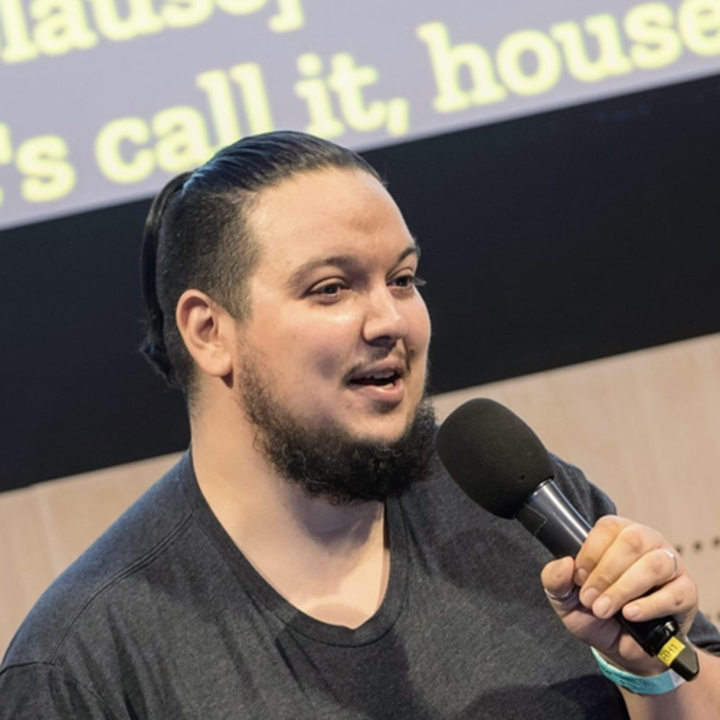Tell us a bit about yourself.
Hey, my name is Alex Lakatos, and I’m an… Advocate. That’s not technically true, I’m a Developer Relations Manager for Fidel now, I’ve gone over to the dark side. But I refuse to acknowledge it. I’m trying to build a DevRel program at Fidel not by building a massive team this year, but by creating a DevRel Culture. Essentially outsourcing my role to different parts of the organisation. So you could say I’m working really hard to make myself redundant. I think that’s the Advocate dream. I’m also half of the Developer Avocados Weekly newsletter, together with Julia.
How did you get into Developer Relations?
It’s a long and convoluted story, but I guess we have the time. I was working for this company in London. And they told me I was out of vacation days, so I needed to stop speaking at conferences. It was only May. So I did what any sane person would do: I quit my job and got a new one just so I’d get more vacation days, so I could speak at more conferences. At one of those conferences, I met Phil the Nash, and he proposed a radical idea: what if speaking at conferences was part of my job, and not despite my job? A spark was born.
Turns out I liked going to conferences a hell of a lot more than I liked going to the office. I started looking at companies that wanted a Developer Advocate and somehow ended up at a dinner with Phil Leggetter. Turns out the Nexmo team was looking for someone just like me. I don’t want to say it was love at first sight, I had to see Phil a couple more times, but eventually, he warmed up to me, and offered me a job. I took him up on that offer, and the rest is history. Got to be part of an award-winning team of developer advocates, travel the world, and meet amazing people in the process.
What advice would you give people looking to join you?
This is tough. There is so much, it’s hard to boil it down in here, it’s worth its own article. In fact, I’ve got a whole talk about that. If you want the TL;DR, it’s got to be about gathering the skills first. The things we do, advocacy, community building, education, technical writing and building demos, are all things you can start doing today. When you got your first job, you probably got hired because you already had some of the skills needed, and people trusted you could acquire the rest on the job. It’s the same here. As long as you can do one of those 5 things, or at least be passionate about some, everyone in the industry is going to invest in you. Look at me, for example. When I joined DevRel, I was only doing community building and advocacy. Four years later, I’ve learned the skills to do the rest.
How has your role changed in the past year?
It first changed because of this little thing called a pandemic. I was already experimenting with Twitch before this happened, so after everyone got travel-banned, I’ve spent some quality time helping my coworkers wrestle with OBS, at the same time doubling down on Twitch with my favourite co-host, Lorna. On top of cancelling in-person events, a lot of work went into figuring out how to still advocate while remotely. It became soon apparent that the amount of effort we used to put into stage presence and stage voice, needed to shift into studio setup, and quality sound and video recording. I have to admit, I was reluctant to embrace this particular hurdle. It took me until November to embrace the fact that online events were the norm, and get a professional light/mirrorless camera/microphone/standing desk setup for conferences.
Secondly, it changed because I changed jobs in the middle of the pandemic. I went from being an individual contributor to building and managing a whole program. The day-to-day activities are a lot more varied, and I spend way more of my time educating my new company about what it is exactly that we do. It’s also very rewarding to switch from being a cog in a relatively big machine to being an enabler for a much smaller company.
How do you see the future of DevRel?
I think we struggle to define what DevRel is and what it isn’t. So I think the future will be just as murky, and it’s going to depend on who’s future we’re talking about exactly. For my DevRel future, I think that’s going to be all about creating a DevRel Culture, instead of DevRel programs. I’ve spent the past six months at Fidel trying to get people to ask themselves “what would Laka do” in every situation. I’ve thoroughly enjoyed spreading the DevRel skills inside my organisation, and I think a few people could switch full time to doing DevRel.




